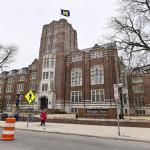Grad Student Strike at the University of Michigan the First Pandemic Pushback on Campus

Labor Day was a working holiday for the Graduate Employees’ Organization (GEO), the union of grad student teachers and staff at the University of Michigan (my alma mater). For months, they have been trying to get the attention of the university leadership, who had been implementing their plan for the return to campus for students without their input. Meetings with various deans were either ignored or unproductive. Last week, the union held a “die-in” on the Diag, the main campus square. Bargaining with the university led nowhere.
On Monday the GEO called a strike, the first that I have heard about from a graduate student union, to protest both the lack of safety for students and staff during the pandemic and the collaboration with police as enforcers of the new rules. It’s an early spasm of dissent from a system at U.S. colleges and universities that appears more concerned with collecting tuition than ensuring that nobody gets sick or dies from COVID-19. And it may kick off a trend of students, faculty, or staff throwing themselves in front of the oncoming freight train of poorly conceived rules that have been sparking outbreaks in college towns across the country.
The strike action is actually illegal under GEO’s contract, signed in April, and under state law, which prohibits strikes from public employees. The university did not hesitate to make these points yesterday. “It’s no secret that a lot of states are extremely hostile to organized labor and working people standing up,” said Amir Fleischmann, secretary of the GEO union, in an interview. “Every labor action contains a certain amount of risk. The risks of not taking action are far greater than those incurred by doing so.”
The GEO has a set of demands that correlate with our interlocking sets of national crises. Like many colleges that have returned, Michigan hasn’t put the safety of its students and faculty first, the union alleges. There is no randomized testing of asymptomatic people throughout the community. “Even our own medical school has said that you need that to prevent a massive outbreak,” Fleischmann said. The union wants an unconditional option for its members to teach remotely; thus far the university has pushed that decision down to individual departments. The lost summer for research has put grad students behind, and the union is asking for a one-year extension to finish that work. And grad students with families are dealing with the same problem as other working families: remote learning at public schools and the need for childcare. The university offers subsidies but only for children below school age; the union wants that expanded.
Of as much importance to the GEO are a group of anti-policing demands, developed over the past couple years but given new linkages during the current moment. The university has expanded cooperation with the Ann Arbor Police Department to enforce social distancing on campus, including a now-aborted plan to have armed officers accompanying the “Michigan Ambassadors” canvassing teams, made up of students and staff and empowered to police congregations of people. “I’ve seen it described as a ‘license to Karen,’” said Fleischmann.
The university took the officers out of the patrols, though members of the Division of Public Safety and Security, a campus security unit, will take part. The GEO wants DPSS funding cut in half and a standard of force for campus police, as well as a severing of ties between the university and the AAPD.
The strike is authorized for one week, and can be reauthorized if demands aren’t met. On Monday the GEO held a virtual meeting with over 700 members, making plans for picketing. Classes started a week ago, but discussion sections and courses taught by student instructors will be cancelled.
With expectations for a new round of COVID infections in the fall, including from groups of people moving indoors (such as in a classroom setting), and with data showing that young, healthy people are at risk of significant sickness from the virus if not death, I’d expect more labor actions on campuses as students file in. Lives are at stake for entire communities, and university administrators have not handled the plans or the criticism well. This is just the beginning.
David Dayen is the executive editor of The American Prospect. His work has appeared in The Intercept, The New Republic, HuffPost, The Washington Post, the Los Angeles Times, and more.
